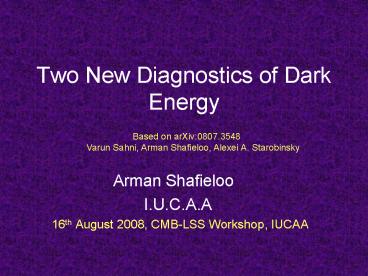Two New Diagnostics of Dark Energy - PowerPoint PPT Presentation
1 / 28
Title:
Two New Diagnostics of Dark Energy
Description:
Current cosmological observations indicate that the universe expands today ... Ia observations, Gold and SNLS, are consistence with the results of detection of ... – PowerPoint PPT presentation
Number of Views:76
Avg rating:3.0/5.0
Title: Two New Diagnostics of Dark Energy
1
Two New Diagnostics of Dark Energy
Based on arXiv0807.3548 Varun
Sahni, Arman Shafieloo, Alexei A. Starobinsky
- Arman Shafieloo
- I.U.C.A.A
- 16th August 2008, CMB-LSS Workshop, IUCAA
2
Introduction
- Current cosmological observations indicate that
the universe expands today with acceleration. - The driving agent of this acceleration is what is
called dark energy, a uniformly distributed
component constituting about 70 of total
energy density and having negative pressure. - The nature of the dark-energy phenomenon
remains to be unknown and is one of the biggest
puzzles in modern cosmology.
3
Dark Energy Models
- Cosmological constant
- Quintessence and k-essence (scalar fields)
- Exotic matter (Chaplygin gas, phantom, etc.)
- Braneworlds (higher-dimensional theories)
- ..
But which one is really responsible for the
acceleration of the expanding universe?!
4
The most direct indication for the current
accelerating expansion of the universe comes from
the accumulating type Ia supernovae data
Supernovae Ia as Standard Candles
Dark Energy
Most general form
5
BUT! ?The observed luminosity distances of
supernovae are not so accurate. ?To calculate the
Hubble parameter and the equation of state of
dark energy, we should use the first and second
derivatives of this data, which enlarges the
errors by huge factors. ?Even future supernovae
data (like SNAP) will not be that accurate to be
used directly to calculate these cosmological
parameters.
6
Y. Gong, JCAP 2005
7
Dealing with observational uncertainties in
matter density
- Small uncertainties in the value of matter
density may affect the reconstruction exercise
quiet dramatically. - Hubble parameter is not affected to a very high
degree by the value of matter density. - Any uncertainties in matter density is bound to
affect the reconstructed w(z).
8
(No Transcript)
9
(No Transcript)
10
Om diagnostics
LCDM Phantom Quintessence
11
Simulated results for 1000 realization of SNAP
data, using smoothing method (Shafieloo et al,
MNRAS 2005).
Quintessence
Phantom
12
SNLS data, CPL parameterization,
13
Union data, CPL parameterization
14
Tracker Models
15
Acceleration Probe
- Acceleration probe is the mean value of the
deceleration parameter
16
Union SN data, CPL parameterization
17
Union SN data BAO CMB, CPL parameterization
18
Some dark energy models consistent with the
current data.
19
Summary
- Om provides a null test of dark energy being a
cosmological constant. - Om can be derived directly from the Hubble
parameter and not its derivatives. - Errors in the reconstruction of Om are smaller
than those appearing in the EOS. - Om is not sensitive to the value of matter
density. - Om can be determined using parametric as well as
non-parametric reconstruction methods. - Acceleration probe depend upon the value of
Hubble parameter and the look-back time (or age
differences). - Om and acceleration probe can be applied on
non-uniform data.
20
The w-Probe
It is possible to obtain more information on the
equation of state of dark energy from the
reconstructed Hubble parameter by considering a
weighted average of the equation of state.
21
The reconstructed w-prob for 3 fiducial models.
1000 realizations
22
Robustness of the The w-Probe to observational
uncertainties in Matter density.
Marginalizing over matter density
W1
W -1/1z
Shafieloo et al, MNRAS 2006
23
Conclusion
- The proposed reconstruction method by smoothing
the SN data appears to be sufficiently accurate
and when applied to SNAP-type observations,
should be able to distinguish between evolving
dark energy models and a cosmological constant. - Reconstructed results are not biased by any
functional fitting form or any assumed
theoretical model. - Reconstructed results at any redshift rely mostly
on the supernovae data points at the same
redshift range. - w-probe provides us with an excellent diagnostic
of dark energy. w-probe is robust to small
uncertainties in the value of matter density. - w-probe can be used by any reconstruction method
that accurately calculates either the dark energy
density or Hubble parameter.
24
Conclusion
- SN Ia observations, Gold and SNLS, are
consistence with the results of detection of the
baryon acoustic peak in a range of matter density
between 0.253 and 0.299, without assuming any
theoretical model. - In the derivation of q(z) and w(z), we found
disagreement between Gold and SNLS datasets. Gold
data suggest the red-shift of the commence of
acceleration at z ? 0.42 while SNLS suggest z ?
0.80 - The derived form of w(z) from SNLS dataset, is in
good concordance with LCDM, while Gold dataset
prefers an evolving - form of dark energy.
- The large error-bars at the high redshifts for
the reconstructed results, reflect the
significant lack of data points. It limits our
ability to say much about the behavior of the
universe at the early stages at high redshifts.
25
Refinement of the method
26
Refinement of the method
Variable Delta
27
Accuracy of the results and the relation with the
quality and quantity of the data
In this method, a large value of delta produces
a smooth result, but the accuracy of
reconstruction worsens, while a small delta gives
a more accurate, but noisy result.
Bias
M. Tegmark, PRD 2002 Tegmark et al,
astro-ph/9805117
Shafieloo et al, MNRAS 2006
28
The Method of Smoothing error-sensitive
Smoothing function (error-sensitive)































